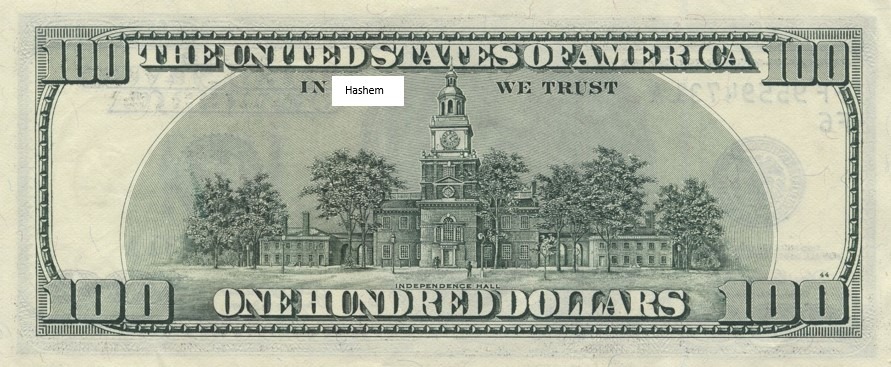Parshas Pinchas
It Is On The Back of Every $100 Bill!
“Therefore tell [Pinchas], that I give him My covenant [of] peace.” (Bamidbar 25:12)
There is a Holocaust story about a gadol, a great Torah leader, (perhaps it was the Brisker Rav), whose family convinced him that they should all try to escape Europe. This gadol had complete trust in Hashem. He knew that Hashem would take care of him and his family. Once, as they were traveling through the woods, a wagon passed by. The driver said that he had food that had been prepared for a wedding feast which had to be cancelled because of the Nazi’s actions. The Rav and his family were treated to a full-course meal. There were similar occurrences in which food was provided for the family. Hashem provides for those who show absolute trust in Him.
In another story, the Nazis were rounding up every Jew they could find and sending them to the concentration camps. The only way to escape this was to board a train heading out of Poland. Rabbi Yitzchak Zev Soloveichik, the Brisker Rav, had to escape with his two teenage daughters and 9-year-old son. The Rav knew that their walk to the train station would entail walking through groups of Nazi soldiers, positioned in different places. With three frightened children, this would be a very difficult venture. Desperate to protect his children, he kept reminding himself that as powerful as their enemies are, there is a power much greater. The great sage known as the Alshich haKadosh had expounded on the words of the pasuk, “Ata Hareisa Lada’as Ki Hashem Hu HaElokim, Ain Od Milvado” – “It has been revealed to you to know, that Hashem is the Almighty One. There is no one else except Him.” The Brisker Rav instructed his children to concentrate on those words and nothing else. They continued meditating on those words, for the entire week that it took to reach the train station. Their minds were focused only on Hashem’s total and sole rulership and sovereignty. They were apparently invisible to the fiercely scrutinizing glare of Nazi guards. Walking past several other checkpoints unnoticed, they boarded the train and crossed the border. They continued their journey and eventually reached the United States.
Rabbeinu Yonah (Mishlei 3:6) says that all our actions should be done with the awareness that it is Hashem who gives us the ability to do them. Moreso, although our personal efforts are required, it is Hashem who determines the success or failure of what we do. This level of bitachon, of trust in Hashem, is not easy to attain. However, as one reaches that level, all his fears and anxieties fade. Why should one worry about anything if Hashem is in control? Rabbeinu Bachya says that a person is given the strength and the ability to serve Hashem. One’s fears and anxieties weaken one’s strengths. One who can develop total faith in Hashem will have more power to serve Hashem, as his fears and anxieties fade. Shlomo Hamelech says, “The name of Hashem is a tower of strength. Through it, the righteous one will race, and he will be strengthened” (Proverbs 18:10). The Ibn Ezra explains that the righteous man will go with the awareness of Hashem. Therefore, he will not stumble. One who has trust in Hashem is like one who is in a fortified tower, dwelling in tranquility without fear of any man. The Ralbag (Proverbs 18:10) says that when one attaches himself to Hashem’s name, it is like he is in a formidable tower, protected from all harm.
Rabbeinu Bachya says that one attains this high level of trust in Hashem by developing the attribute of fear of Hashem. Pinchas had both these attributes of fear of and trust in Hashem. That is why he succeeded in killing Zimri, the prince of the tribe of Shimon and Kozbi, the Midianite princess, who sinned publicly. And that is why Hashem performed many miracles for Pinchas, saving his life. In addition, Hashem promised Pinchas great rewards. The Ibn Ezra says that one of the rewards was that all future Kohanim Gedolim would come from the family of Pinchas. Chizkuni says another reward was that Pinchas would be protected from the vengeance of the relatives of Zimri and Kozbi. HaEmek Davar says that Pinchas also received the blessing that he would always feel peace and serenity. The Malbim says that Pinchas was also promised a very long life. Similarly, the prophet, Daniel, was saved when he was thrown into a den of lions and was not harmed. Daniel said, “My G-d sent His angel and shut the lions’ mouths, so that they have not hurt me.” (Daniel 6:23) The Malbim (Daniel 6:24) explains that Daniel merited the miracle of being saved in the merit of his total trust in Hashem.
When we stop and think, we will become aware of numerous times, every day, when we see the hidden hand of Hashem helping each of us. Thank you, Hashem, that my car battery died in front of my house and not in New Jersey, where I was headed. Thank you, Hashem, that I “just happened” to meet the person that I have been trying to reach. Thank you, Hashem, that Shlomo’s car was delayed in unusually heavy traffic causing him to miss the flight, which eventually crashed. Thank you, Hashem, that Meir was fired from his job, and then got a much better one.
Sometimes Hashem performs miracles for those who have a high level of trust in Him. However, that is not always the case. Sometimes Hashem decides not to save us from certain situations, for our ultimate benefit, for reasons unbeknownst to us. Trust in Hashem means that we trust that Hashem does whatever is best for us, even though we may not yet understand how it is good for us.
The Sanz-Klausenberger rebbe, Rabbi Yekusiel Yehudah Halberstam zt”l, said very poignant words that illustrate this point. After the Holocaust, he spoke about how the Nazis had murdered his wife and ten of his children in front of his eyes. He said the following words, “Ribbono Shel Olam (Hashem), I know that this is what you decreed for me. You want me to be a man who is a widower and who lost his children, and I will serve You in that capacity to the best of my ability.” (Wings of Faith, Rabbi Asher Zelig Rubenstein zt”l on Shaar HaBitachon by Rabbi Yosef Tropper)
Rabbi Yekusiel Yehudah Halberstam had total faith and trust in Hashem. He was saved from death on numerous occasions. On one such occasion, as the Russian Army moved closer to Poland, the Germans decided to liquidate the special ghetto-clearing unit of which Rabbi Halberstam was a member. All the prisoners were taken to a field outside of Warsaw, told to undress and stand near open pits, where soldiers prepared to machine-gun them. At the last moment, however, a car sped into the field. A high-ranking officer jumped out. He communicated the special order from Berlin to stop the execution and send the prisoners to the Dachau concentration camp, where they were needed as slave laborers.
Despite his powerful faith in Hashem, Rabbi Halberstam did undergo torture and beatings. Why? Because for some unknown reason, Hashem felt that this was the best for him. Yet, his trust in Hashem did not falter.
Suffering personal loss, tragedy and brutality that would drive an ordinary person to the depths of despair, Rabbi Halberstam was able to go on with his life. He inspired and comforted his fellow survivors. Right after the war, he established religious schools for boys and girls and yeshivos for young men in 19 different Displaced Persons camps. He also set up a kosher slaughterhouse and built a kosher mikveh. When he arrived in the United States, he remarried and had 7 children. He re-established his chasidus both in the United States and Israel and founded the religious neighborhoods of Kiryat Sanz in Netanya and in Yerushalayim. There he also established girls’ and boys’ schools and yeshivas, an orphanage, an old-age home, and a hospital run according to Jewish law. (The Klausenberger Rebbe by Judah Lifschitz)
Hashem determines our successes and failures. Let us learn from the Klausenberger rebbe, to be steadfast
in our total trust in Hashem, regardless of our difficult challenges.
We can do that by recognizing that Hashem loves us and only wants the best for us.





